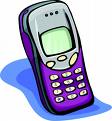Cell Phones

Cell phones have now become a "must have" for almost everyone. It is amazing to see all the places where a cell phone is used—as well as a bit disconcerting when inconsiderate people use them in inappropriate places.
When folks decide to take off in their RV and explore new and interesting places, their cell phone is one of the items that they make sure that they didn't forget before hitting the road.
Just as there are many different types of RVs and many different RV lifestyles, the cell phone needs of people vary widely from user to user. The casual weekender or vacaton traveler can get by quite nicely, usually, with their existing cell phone provider and service.
The Extended Timers and Full Timers, however, usually have different needs, since they travel all over the country—and many of them rely on their cell phones to provide their access to the internet for email and on-line banking. If they rely on a "local" cell phone plan with lots of minutes, their monthly charges for long distance and roaming are apt to be horrendous.
"Which cell phone service should I use?"
This is a common question on the RV bulletin board systems, and, of coure, the answers vary widely. We are Extended Timers, and we use our cell phones for both keeping in touch and also for getting on the Internet to check our emails and to use our on-line banking services—especially bill paying.
Like many other RVers who rely on their cell phones, we use the Verizon National One Rate plan. To keep our expenses down, we chose to only have 350 minutes per month of chargeable air time, but we have "free" time after 9 PM on weekdays, and all day/night on weekends—as well as having no roaming charges and no long distance charges wherever we are in the United states.
One thing we like about having no long distance charges is that we never have to remember to find out the local Earthlink access number for the locality in which we are camped. We simply dial the regular Earthlink access number that we use at home. Of course, being of the pecunious bent (i.e., kinda cheap), we wait until after 9 PM to make our daily email checks—saving our chargeable minutes for chats with the kids.
There are many, many cell phone providers throughout the United States, but many of them are local to a particular area and may not have wide-spread coverage throughout the United States (without extra charges). You are encouraged to do your homework before deciding on a cell phone provider.
What About Cell Phone Usage in Canada and Mexico?
You need to be very aware that using your cell phone in either Canada or Mexico can be very hazardous to your wallet (if you use even just a few minutes of air time). Many of you might be shocked to learn that air time in either Canada or Mexico is usually about $1/minute! (Yipes!)
 |
Cell phone charges in Canada and Mexico can be more than $1 per minute! |
 |
Seasoned RVers have learned to shut off their cell phones while driving through Canada or while in Mexico. "But what about emails?" you might ask. Our best advice is to find an RV park that has wifi, or find the local library to check your email—but good luck with that in Mexico.
ICE — In Case of Emergency

Many RV folks have never heard of ICE, or what it's purpose is all about. Paramedics throughout most of the United States have been trained to look at the cell phone of an injured/unconscious person to find a contact for emergency notification.
Take a moment or two and make an additional entry into your cell phone "telephone book." Make an entry for ICE and put the telephone number of the emergency contact you would like to be notified if you are having a medical emergency.
ICE is a quick and easy way to ensure that someone you know and trust will be contacted if you are in an emergency situation.

